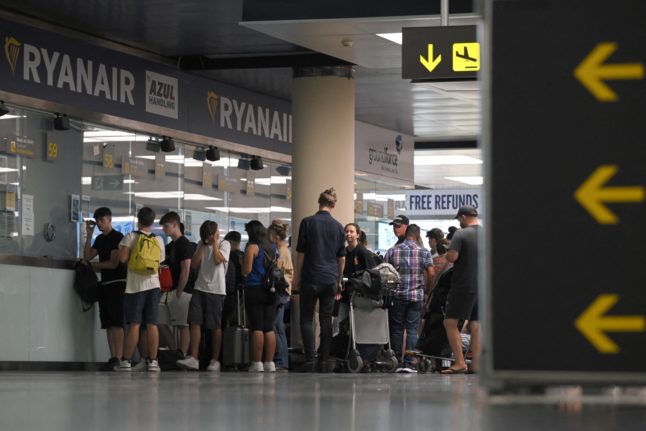Airport staff in Valencia and Madrid are going on strike over key Easter dates, meaning that as many as a thousand flights could be delayed or cancelled during one of the busiest travel periods of the year.
Semana Santa celebrations have already been disrupted by rain this year, causing the cancellation of processions across the country, but travel during the busy Easter period is also set to be affected by strike action at two of Spain’s major airports.
At Valencia Manises airport, one of the busiest airports in Spain which welcomed almost 10 million passengers in 2023, flights could be affected over the entire Easter weekend (Thursday March 28th-Monday April 1st inclusive) because workers will walk out between 11am-13am on each day.
At Madrid-Barajas airport, the UGT union has called a strike for Wednesday 27th and Friday 29th March between 7am-12pm.
READ ALSO: Spain’s Valencia set for airport strike over Easter holidays
The walkout at Valencia begins today, March 28th. According to the live departures board provided by Aena, Spain’s national airport operator, which you can follow here, as of 9.30am flights are leaving the airport with minor delays of up to 40 minutes, though this is before the strike officially begins at 11am.
Aena live departures for Madrid-Barajas show that some flights have left with delays of up to 45 minutes this morning, though it is worth noting that staff are not officially on strike there today (walkouts in Madrid are Wednesday 27th and Friday 29th March between 7am-12pm) which could suggest a knock-on effect from yesterday’s strike action.
The industrial action comes during not only during Easter celebrations but operación salida, an intensely busy travel period during which millions of Spaniards travel home or go on holiday for Semana Santa.
READ ALSO: Strike action at Spanish airports set to disrupt Easter travel
Staff at Madrid-Barajas are striking for better pay and a new collective bargaining agreement, arguing their salaries have declined in real terms due to inflation, and employees at Valencia Manises are protesting against long working hours and a lack of staff, plus a dispute with regards to overtime pay.
Spanish media reports suggest that up to 1000 flights could be cancelled as a result of the walkouts. On Wednesday 27th, there was also ‘chaos’ at Palma de Mallorca airport, according to Spanish media, with long queues at security controls meaning it took many passengers an hour to get to their departure gate.
Which flights will be affected by Spain’s airport strikes over Easter?
Knowing exactly which flights could be affected, however, isn’t entirely clear. There seems to be certain airlines and routes more likely to be affected than others.
Madrid-Barajas
It is still unclear exactly which flights could be affected at Madrid-Barajas, so it is advisable to check with your airline. You can check the airport schedule on the Aena website here.
On Wednesday 27th March, the day the strike began in Madrid, both short and long-haul flights were delayed or cancelled.
Departure records from Flight Stats show that long-haul flights to the United States were cancelled throughout the day, and short-haul flights around Europe and to other Spanish cities were running with delays of up to 2 hours. Many also arrived on schedule, however.
Valencia Manises
As the strike action begins in Valencia on Thursday morning, reports suggest that several dozen flights could be cancelled, delayed or rescheduled. If you are uncertain about your flight, check with your airline.
On Thursday 28th, flights that could be affected by the stoppage include:
- Ryanair flights connecting Valencia with Rome, Milan Bologna, Breslavia and Sofia
- United and Lufthansa flights connecting Valencia with Frankfurt and Munich
- Easyjet and British Airways flights between Valencia and London
- Turkish Airlines flights between Valencia and Istanbul
- Air Europa flights between Valencia and Palma de Mallorca
- Swiss flights connecting Valencia to Zurich
- Volotea flights between Valencia and A Coruña
- Eurowings’ Valencia-Stuttgart flights
On Friday 29th, flights that could be cancelled are:
- Ryanair to Milan, Treviso, Trieste, Dublin, Marrakech and Palma de Mallorca
- SAP and Tap Portugal flights between Valencia and Lisbon
- United to Frankfurt
- Lufthansa to Frankfurt, Munich
- Austrian to Vienna
- Air Nostrum to Ibiza
- Delta to París Charles de Gaulle
- Air France to París Charles de Gaulle
- Air Europa to Palma de Mallorca
- Easyjet to London
- British Airways to London
- Brussels Airlines to Brussels
- Iberia to Tenerife North
- Tap Portugal to Lisbon
- Turkish Airlines to Istanbul
- Swiss to Zúrich
- Volotea to A Coruña, San Sebastián
- Vueling to Tenerife North
- Eurowings to Stuttgart
There is no further information yet about which flights could be affected on Saturday 30th, Sunday 31st and Monday April 1st.



 Please whitelist us to continue reading.
Please whitelist us to continue reading.
Member comments